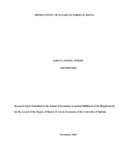| dc.description.abstract | This research estimated the productivity of sugar factories in Kenya for the period 2004 – 2013. Productivity changes were calculated using Data Envelopment Analysis (DEA) approach. The study was done in two stages; the first stage measured productivity changes and decomposed Total Factor Productivity (TFP) growth into its components while the second stage examined the exogenous factors that affected TFP growth. A decomposition of the TFP measures was done to assess whether the change in TFP was caused by either changes in technical efficiency or changes in technical change. The study further examined the effect of market share, cane quality, factory age, size of the industry and ownership structure on productivity changes among sugar factories. The results suggested that the mean TFP growth index for the period 2004 to 2013 was 0.15%, technical efficiency growth index was 11.48% and technical change index was -5.12%. The study results suggested that sugar factories were facing productivity growth problems as TFP growth generally remained constant. TFP growth was mainly influenced by technical change. Government ownership of firms and increase in factory age negatively affected TFP growth while improvement in cane quality increased TFP growth. Market share and number of factories in the industry were not significant determinants of TFP changes. The study recommended privatization of state owned sugar factories and improvement of technical change index through technology adoption and innovation. | en_US |

